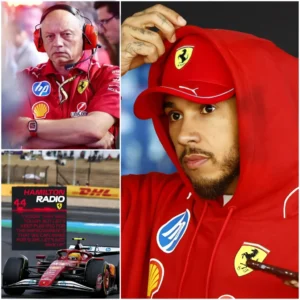Adrian Newey, the renowned chief technical officer of Red Bull Racing, has recently made headlines with his strong criticism of Sky Sports, accusing the broadcaster of unfairly treating Max Verstappen, the reigning Formula 1 World Champion and Red Bull’s star driver. Newey’s comments have sparked significant debate in the motorsport community, shedding light on the tensions between media coverage and team dynamics.

In a pointed statement, Newey expressed his dissatisfaction with how Sky Sports has handled its coverage of Verstappen. The veteran engineer, known for his pivotal role in Red Bull’s multiple championship successes, asserted that the broadcaster’s approach towards Verstappen has been less than impartial. According to Newey, Sky Sports has often portrayed Verstappen in a negative light, which he believes is both unjust and damaging to the driver’s reputation.
“Max Verstappen is one of the most talented drivers in Formula 1 history,” Newey stated. “However, the way Sky Sports has been covering him is not only biased but also unfairly critical. Their portrayal of Max has been consistently negative, which does not reflect his true capabilities and achievements.”
Newey’s criticism is not merely about personal grievances but highlights broader concerns regarding media bias in sports journalism. He argued that such biased reporting can influence public perception and unfairly affect a driver’s career. Verstappen, who has been a dominant force in recent seasons, has frequently been at the center of media scrutiny, and Newey feels that this scrutiny has crossed the line into unjust criticism.
Sky Sports, a leading broadcaster of Formula 1, has faced scrutiny before for its coverage of various drivers and teams. However, Newey’s comments bring a new level of prominence to the issue, given his high profile within the sport. His remarks underscore the ongoing debate about the role of media in shaping public opinion and the responsibility of broadcasters to provide balanced and fair coverage.

In response to Newey’s criticism, Sky Sports has yet to issue a detailed statement. The broadcaster typically maintains a strong editorial stance, and it remains to be seen how they will address the allegations raised by one of Formula 1’s most influential figures. The network’s approach to Verstappen and other drivers will likely be scrutinized further in light of Newey’s comments.
The incident raises important questions about the relationship between media and athletes. As Formula 1 continues to grow in popularity, the influence of media coverage on drivers’ careers and public perception becomes increasingly significant. Newey’s intervention serves as a reminder of the power dynamics at play and the need for fairness in sports journalism.
In conclusion, Adrian Newey’s strong criticism of Sky Sports over their treatment of Max Verstappen highlights ongoing issues of media bias and fairness in Formula 1 coverage. As the debate unfolds, it remains to be seen how this will impact both the media’s approach and Verstappen’s public image. For now, Newey’s remarks have certainly added a new layer to the conversation about media responsibility and its impact on the world of motorsport.






